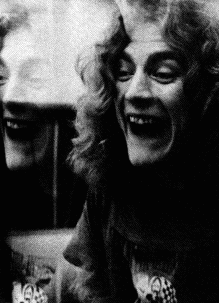|
I wanted to be a part of that great ambiguous movement, that kind of fanfare of change and responsibility. I look at some of the lyrics now, and perhaps they were a bit embarrassing, or naive or cute or quaint. The fact that I thought I was going to contribute to something that was going to make some sense and take us out of the period of early-Sixties confusion and actually bring on another kind of confusion later on was enough for me. To be a part of all that made us all raise a little bit higher than we expected. Whatever limited qualities or capabilities we had, certainly we found a real hotbed of enthusiasm to absorb whatever it was we were doing.
My singing voice came out of the loins of a civil engineer. I didn't ask him too much about it. He was a bit embarrassed about me being around at all. Seriously, I don't know where my voice comes from. I listened a lot to Ray Charles. I wanted to be Ray Charles. I also liked to listen to Mose Allison, Oscar Brown, Jr., Maurice Williams & the Zodiacs. I loved the way Maurice Williams' voice used to sort of trail around and leave you high up in the clouds, and then swoop down again. I was like a middle-class kid. My dad used to drop me off at the club where I used to play, and at that club I was exposed to the black man and his music. I could sit there and listen to King Pleasure, even though I was far too young to know who King Pleasure was. It was very spontaneous most of the time in Led Zeppelin. Things were created virtually as a four-piece band. It was Jimmy Page bringing in cassettes or ideas that were then created on the spot. Sometimes John Paul Jones would contribute the main leading part of a song, and then it would be a pretty quick arrangement of bits and pieces so that the thing fitted together rather quickly. We set standards for ourselves that we knew we couldn't ever dip away from. The first album took thirty-six hours and cost £1,700. The enthusiasm quality was such that we could actually turn up when we were ready, really hot, and do it. The longest period of time that ever elapsed between creation and a piece of music being there to smile at and brag about was the time it took to design the album cover. Looking back at it now, it's quite hilarious that we followed everything meticulously right down the line. You could lose more sleep worrying about an argument with Atlantic Records about having no print at all on the cover of Houses of the Holy. Generally, we just fucked around with the previous order of things.
I didn't even know what we had. I was nineteen when I heard the tapes of our first rehearsal. I mean, it really wasn't a pretty thing. It wasn't supposed to be a pretty thing. It was just an unleashing of energy. But it felt like it was something I always wanted. I had a couple of bad knocks which, no matter what happens, will always have taken their toll on me. I know that my kind of vision, or the carefree element I had, disappeared instantly when I had my automobile accident in 1975. That kind of ramshackled "I'll take the world now" attitude was completely gone.
But I never stopped singing. I just played a gig in the Potteries, a district in England where they make porcelain. I played in a hall that I hadn't played in for fifteen years, and I sang better than I had ever sung in my life. I don't view life in terms of singing in front of 60,000 people at the Pontiac Silverdome. It's such a fine line between having a great night and having an average night. My enthusiasm and my capacity to give is more important than the magnitude of the reception.
The satisfaction today is great. It's important because I'm trying to make some kind of move on my own terms, without the hysteria that was common only to that great epoch. I mean, David Gilmour of Pink Floyd is having the time of his life right now. He'd be the first to say how wonderful it is. Pink Floyd is merrily dancing along. But right now I don't want to hang onto the name Led Zeppelin and say, "Here it is again. We better get the keyboard player on a diet." I'm not Led Zeppelin. I'm just this character who keeps saying, "I'm not Led Zeppelin." But I really, really would like to be in Led Zeppelin again. Whether or not time allows that to happen, I don't know. Led Zeppelin would have to be a combination of what it was and what it should be. It's something that would take quite a lot of work. That work would be quite painstaking. Led Zeppelin would have to come out with all the pride it had initially. I'm afraid there are a lot of bands reforming for the hell of it, and I find it all a little bit forward. I believe that the power is still there between Jimmy and myself. Led Zeppelin doesn't need to be encouraged to become Led Zeppelin again. It'll happen or it won't.
Melinda Rhodes When were these statements made - does anyone know the year? Melinda Rhodes superseventies (Moderator) Melinda they were made in 1988 or shortly before.
|



